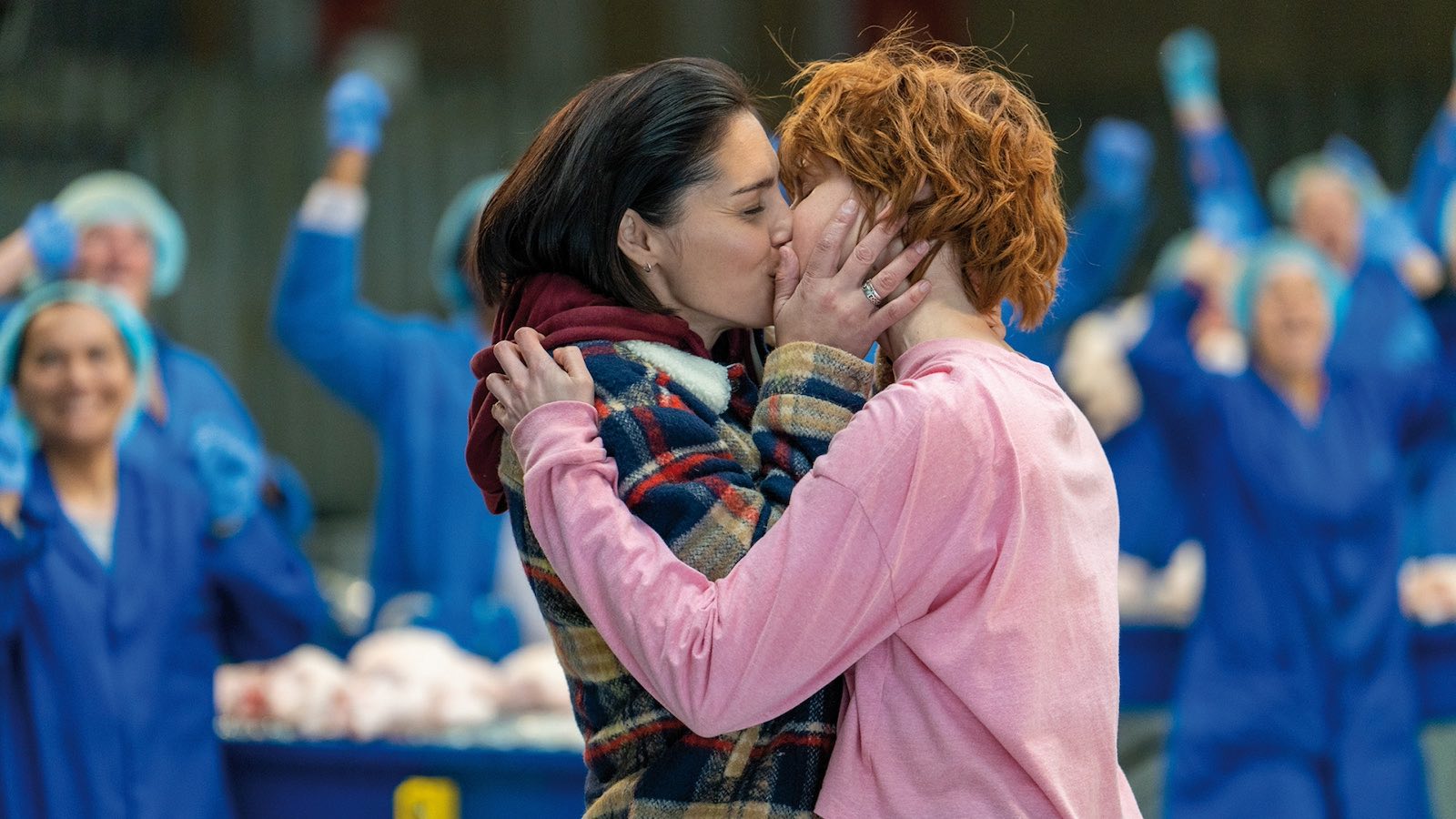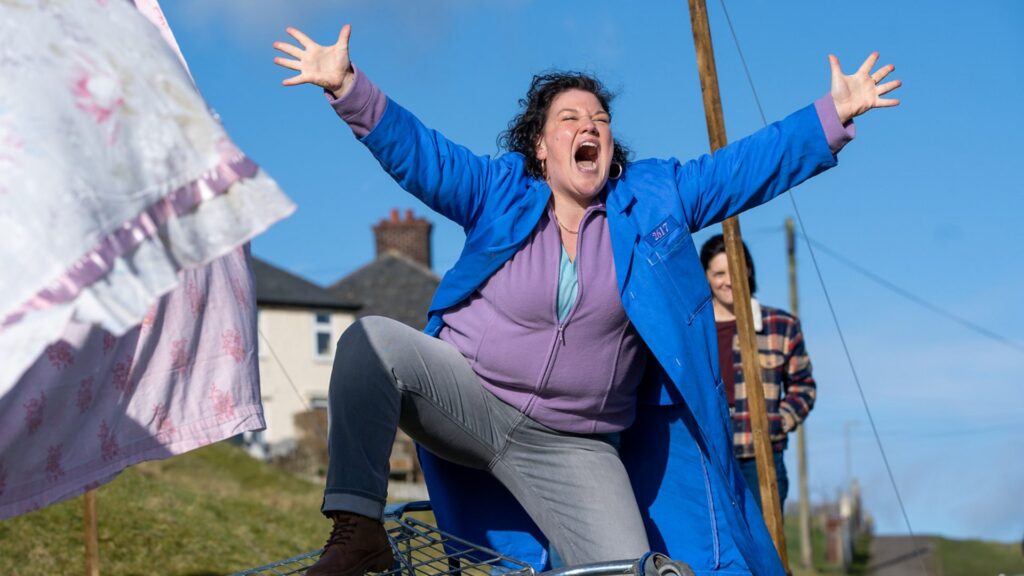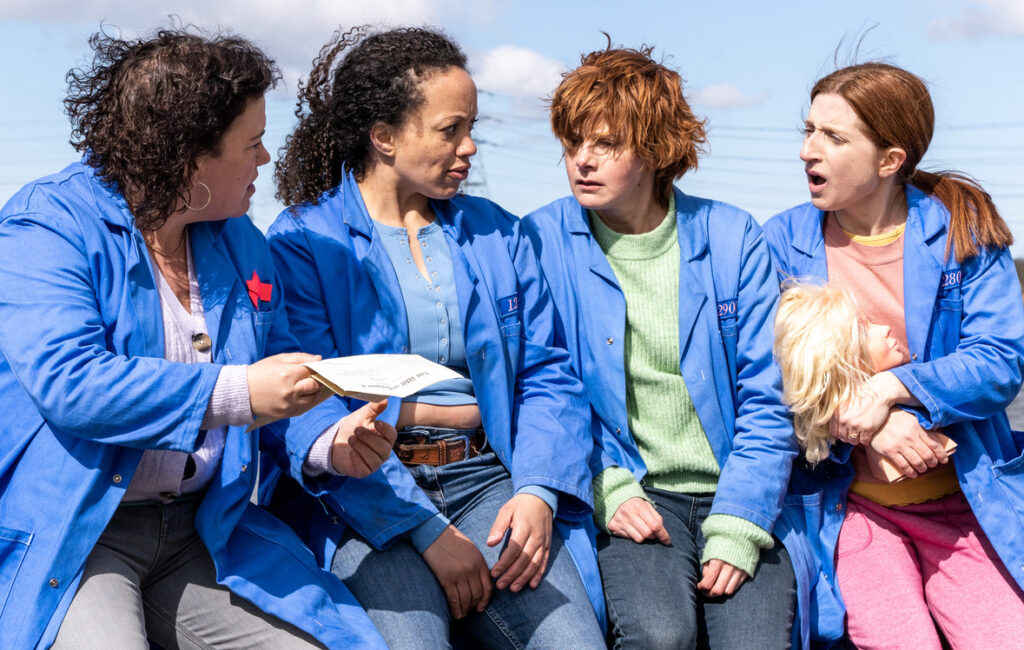
The real-life stories behind fantastical new film Chuck Chuck Baby
Set against the backdrop of a north Walian chicken factory, Chuck Chuck Baby is a new LGBTQ+ musical comedy film by Janis Pugh, a former factory worker turned filmmaker. Speaking to Pugh and the other women who inspired the film’s story, Isabel Thomas finds out more about their vibrant, resilient sisterhood.
Down the road from Flintshire’s closed-down mines, remembered in memorial statues and caving clubs, there’s a different industry with a survivalist camaraderie to rival that of the miners. Here, in direct contrast to the mining industry, the workers are mostly women, and the natural resource is not to be found in the ground, but bred, fed and transported in crates, its guts removed by those who can handle their gag reflexes (and sometimes thrown around by pranksters) before it’s safely sealed in plastic.
This is the world of the chicken factory, the setting of a new LGBTQ+ musical comedy film by Wales’ more fantastical answer to Ken Loach. At thex centre of Chuck Chuck Baby is a romance between two women who have been dealt grim home lives and adopted opposite coping mechanisms.
musical comedy film by Wales’ more fantastical answer to Ken Loach. At thex centre of Chuck Chuck Baby is a romance between two women who have been dealt grim home lives and adopted opposite coping mechanisms.
While Joanne is proud of her ‘girl in every port’ lifestyle but struggles to form lasting connections, Helen finds her own space for escapist bliss or emotional catharsis by listening to music alone in earphones or in the car. But when she pulls up to the factory doors, her coworkers link arms with her and sing along. Away from home, she is part of a sisterhood, belting hits together as they disappear into the factory. It’s a fairly surreal moment: where is the music coming from? Did they all have the same radio station on? Are they pretending they’re in a musical, or are we in fact watching a musical?
“We all used music to survive,” says Janis Pugh – Chuck Chuck Baby’s scriptwriter and director, and a former factory worker. It’s a practice that continued onto the set of the film, via a handful of extras who were there at the same factory in the 1980s. “We would play games and start singing songs like that on set,” recalls one, Babs, who joined the film “for a bit of a giggle” and with an initial degree of nervousness. “It’s astounding… time is fleeting!”
Thanks to an advert in the newspaper and a post in the chicken factory’s Facebook group, she and her friends found themselves at a ‘sort-of audition’ in front of the filmmakers, then onto a movie set. Before they knew it, they were off to the Edinburgh Film Festival and into the limelight of a paparazzi fascinated by four normal women in their blue overalls. It’s a film where music has assisted women to take a leap into the extraordinary, both on- and offscreen. If the lines between genre tropes and realism in Chuck Chuck Baby are blurred, it’s because sometimes real life is experienced that way.
 In the 80s, when these friends started work at the chicken factory, the radio was often on, and workers would dance and sing along to disco hits from the previous decade. But it was not uncommon for songs to emerge spontaneously and even theatrically from the factory floor: someone would sing the first line, and a coworker would respond with the next.
In the 80s, when these friends started work at the chicken factory, the radio was often on, and workers would dance and sing along to disco hits from the previous decade. But it was not uncommon for songs to emerge spontaneously and even theatrically from the factory floor: someone would sing the first line, and a coworker would respond with the next.
According to Babs, things would occasionally become too flamboyant, and the first-aid nurse would take a break from treating incidents such as ‘green gallbladder liquid in the eye’ to run in and tell them off for disturbing patients with too much noise. It’s no surprise that among the strongest workplace memories of these ex-coworkers are two of the most melodramatic releases of the era: Meat Loaf’s Bat Out Of Hell album and the Rocky Horror Picture Show soundtrack.
For the large proportion of young women who started just out of school, the factory was an entry into adulthood and a place to learn how to negotiate friendships, relationships, labour and leisure time in this new world of independence. “At the chicken factory, we learned about life,” says Babs’ friend Amanda. There was a lack of ambitious career advice for young women from their educators, and they certainly weren’t expected to go into further education. But it was on the factory floor that advice was given and life lessons were learned.
New girls would learn how to work with different characters, adapting their humour and around the more difficult personalities, while older women functioned as mentors. Amid the noise, women stood side by side told each other about their greatest hopes and deepest fears, and sometimes shared their distressing home lives. Lip reading was a valuable skill, as information was either passed on down the line as gossip or thoughtfully kept private.
For those who dealt with abuse or struggled with caring responsibilities, the factory floor, despite the noise, the smell and the gore, could be a place of escape and a refuge of trust. “It was an awful place to work, but we really had some great times,” says another of the friends, Vanessa. “Factory work is mundane, but it’s got a big heart.”
In the decades since Vanessa, Babs, Amanda, Janis and their sisters started at the chicken factory, messages of female empowerment, girl-bossing and ‘following your dreams’ travel via the phone, TV or cinema screen into the towns and neighbourhoods where career advice and mentorship might be otherwise lacking. As Janis says, fascinated by her mother – who, given a chance, found herself on TV representing a national trade union – this is a film about incredible women with strength and intelligence.
While, at the time, men in the town were expected to deal with the heavy and technical work while women used their hands to gut, sort and pack, they now know they’re capable of doing something else, following careers that they personally find more rewarding such as care work or self-employment. But none can match the workplace conviviality of the chicken factory. Perhaps – in some parallel with the darkness and danger of the mines, and the support systems of the workmen’s clubs, unions and brass bands – the tougher the work, the stronger the comradeship.
 Friendships made at the factory last to this day. More than 40 years after they met, the bonds between some of the women are as tight as ever. In part, the adventure of being involved in Chuck Chuck Baby and the attention it brings to female friendships has brought them closer together. The film is full of high fences dividing up communities, but the message is to connect, to love more – in all love’s forms – and to simply be kind. As much as ignorance and fear drives people apart, ordinary life is also filled with poignant moments of connection that rival some of the most climactic Hollywood scenes.
Friendships made at the factory last to this day. More than 40 years after they met, the bonds between some of the women are as tight as ever. In part, the adventure of being involved in Chuck Chuck Baby and the attention it brings to female friendships has brought them closer together. The film is full of high fences dividing up communities, but the message is to connect, to love more – in all love’s forms – and to simply be kind. As much as ignorance and fear drives people apart, ordinary life is also filled with poignant moments of connection that rival some of the most climactic Hollywood scenes.
“I love big-budget action movies,’ says Babs, “but when all’s said and done, it’s not your life. Beautiful things happen on the streets of your own town, every day.” As a trailblazing semi-magical-realist musical comedy, Chuck Chuck Baby manages to capture both: the romance of cinema and the beauty of overlooked people sharing special, everyday moments.
Chuck Chuck Baby is in cinemas from Friday 19th July.
Download the full article here.
About the writer: Isabel Thomas (she/her) is a musician, critic, researcher and writer from Cardiff. Funded by a NUAcT project on mainstream song, her PhD research uses archives, observation, media analysis and oral histories to uncover the history of music within membershipbased social spaces in industrial communities across the UK.
X: @isabelgthomas | LinkedIn
This article was commissioned by Film Hub Wales as part of our Made in Wales strategy, which celebrates films with Welsh connections, thanks to funding from Creative Wales and the National Lottery via the BFI.

